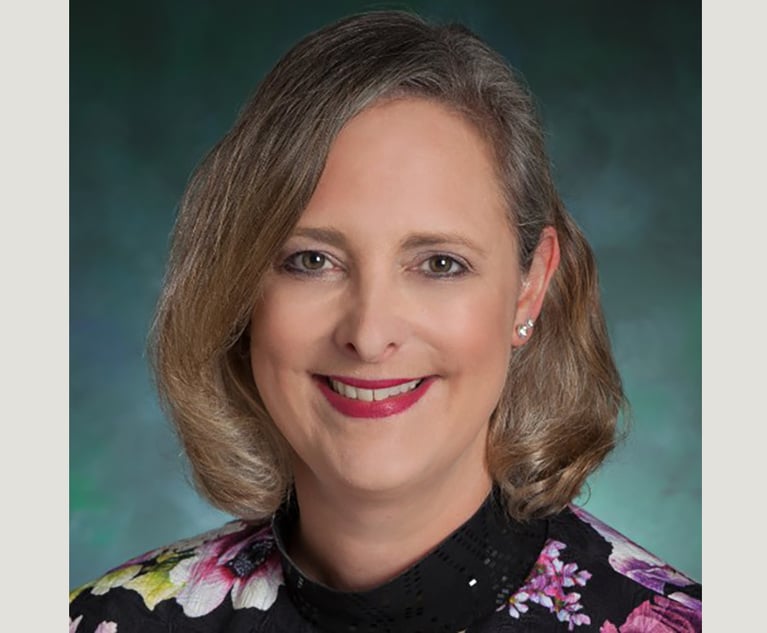Labor: Politics in the workplace in an election year
Fall typically brings distractions to the workplace, from some employees monitoring fantasy football statistics online to others discussing their kids back-to-school issues around the water cooler.
November 19, 2012 at 02:30 AM
4 minute read
The original version of this story was published on Law.com
Fall typically brings distractions to the workplace, from some employees monitoring fantasy football statistics online to others discussing their kids' back-to-school issues around the water cooler. In a big election year such as 2012, however, there is an intensified discourse on politics and all things related, as the current realities of a 24/7 news cycle and the ease of access to information that social media brings adds to an already hot debate.
But like many other areas in employer-employee relations, it is critical for companies to develop the proper mindset when it comes to understand what employee conduct they can regulate and when they should take a step back. As a general principle, private-sector employees have no constitutional right to free speech or political expression in the workplace. Yet, there are other areas in which they have protection.
First, employers should differentiate between employee political activity during working time and nonworking time. With few exceptions, employers are generally free to regulate political activity and speech during work time and on company premises, or through the use of company resources. For example, an employer may generally adopt “no solicitation” rules to proscribe campaigning or solicitations for a party/candidate during and at work, provided that such a policy is neutral and implemented in a nondiscriminatory way.
Off-duty political activities pose a bigger hurdle. Many states have a “legal activities law” that prohibits an employer from firing, refusing to hire or discriminating against an employee because of his “political activities” outside of working hours, off the company's premises and without using any company equipment or property. For example, in New York, “political activities” is defined in New York Labor Law Section 201-d as running for office, campaigning for a candidate or participating in political fundraising. However, an employer may still regulate those activities if they create a material conflict with the company's trade secrets or other identifiable proprietary interests.
Second, employers should refrain from imposing, and perhaps even sharing, the political views of the company's principals with its employees. For example, many state laws, such as New York Election Law Section 17-150, prohibit the use or threat of violence to compel an employee to vote for or against a person or proposition, any threat to tie compensation to an employee's political opinions or actions, and posting any notice or statement (within 90 days of a general election) that suggests a facility closure, work stoppage or reduction in pay will occur if a ticket or candidate is elected or defeated. Simply, refraining from discussing the company's political views and activities will minimize the number of employee claims of coercion or retaliation.
Third, employers should take great caution in attempting to monitor the political communications of their employees. The federal Wiretap Act and similar state and local laws contain significant remedies for the unlawful interception, use and disclosure of any “wire, oral, or electronic communication.” Employers should also be sensitive to restrictions on eavesdropping on the conversations of others without the requisite consent, and also to the types of video monitoring that may or may not be appropriate in a particular jurisdiction.
The meteoric rise in employee social media use does not change the rules but has added a new field on which the political game is being played. Hot-button social issues such as religious freedom and same-sex marriage often become intertwined with political discourse, and the potential for employer liability increases as employees take to Facebook and other social-networking sites and blogs to discuss their views with co-workers. Employers must ensure that their policies addressing harassment, discrimination, cyber bullying and violence in the workplace apply equally to the political discussion.
Finally, employers should understand that many statutes impose affirmative obligations to allow such things as the fundamental right to vote. For example, New York State Election Law Section 3-110 allows employees to take a partially paid leave of absence to vote on Election Day under certain circumstances, such as when the employee has insufficient time to vote outside working hours. Furthermore, a 2008 General Counsel Memorandum by the National Labor Relations Board states that leaving work early to participate in a political rally may constitute “protected concerted activity” under federal law if there is a direct nexus between the subject of the advocacy and an identifiable employment concern of the employee.
The takeaway for employers when it comes to politics in the workplace? Like so many other employment-related decisions that a company wants to make throughout the year, avoid the trigger-happy decisions made when it comes to regulating or disciplining political speech or activities.
This content has been archived. It is available through our partners, LexisNexis® and Bloomberg Law.
To view this content, please continue to their sites.
Not a Lexis Subscriber?
Subscribe Now
Not a Bloomberg Law Subscriber?
Subscribe Now
NOT FOR REPRINT
© 2025 ALM Global, LLC, All Rights Reserved. Request academic re-use from www.copyright.com. All other uses, submit a request to [email protected]. For more information visit Asset & Logo Licensing.
You Might Like
View All
Global Software Firm Trying to Jump-Start Growth Hands CLO Post to 3-Time Legal Chief

In-House Legal Network The L Suite Acquires Legal E-Learning Platform Luminate+

John Deere Annual Meeting Offers Peek Into DEI Strife That Looms for Companies Nationwide
7 minute read
Antitrust in Trump 2.0: Expect Gap Filling from State Attorneys General
6 minute readTrending Stories
Who Got The Work
J. Brugh Lower of Gibbons has entered an appearance for industrial equipment supplier Devco Corporation in a pending trademark infringement lawsuit. The suit, accusing the defendant of selling knock-off Graco products, was filed Dec. 18 in New Jersey District Court by Rivkin Radler on behalf of Graco Inc. and Graco Minnesota. The case, assigned to U.S. District Judge Zahid N. Quraishi, is 3:24-cv-11294, Graco Inc. et al v. Devco Corporation.
Who Got The Work
Rebecca Maller-Stein and Kent A. Yalowitz of Arnold & Porter Kaye Scholer have entered their appearances for Hanaco Venture Capital and its executives, Lior Prosor and David Frankel, in a pending securities lawsuit. The action, filed on Dec. 24 in New York Southern District Court by Zell, Aron & Co. on behalf of Goldeneye Advisors, accuses the defendants of negligently and fraudulently managing the plaintiff's $1 million investment. The case, assigned to U.S. District Judge Vernon S. Broderick, is 1:24-cv-09918, Goldeneye Advisors, LLC v. Hanaco Venture Capital, Ltd. et al.
Who Got The Work
Attorneys from A&O Shearman has stepped in as defense counsel for Toronto-Dominion Bank and other defendants in a pending securities class action. The suit, filed Dec. 11 in New York Southern District Court by Bleichmar Fonti & Auld, accuses the defendants of concealing the bank's 'pervasive' deficiencies in regards to its compliance with the Bank Secrecy Act and the quality of its anti-money laundering controls. The case, assigned to U.S. District Judge Arun Subramanian, is 1:24-cv-09445, Gonzalez v. The Toronto-Dominion Bank et al.
Who Got The Work
Crown Castle International, a Pennsylvania company providing shared communications infrastructure, has turned to Luke D. Wolf of Gordon Rees Scully Mansukhani to fend off a pending breach-of-contract lawsuit. The court action, filed Nov. 25 in Michigan Eastern District Court by Hooper Hathaway PC on behalf of The Town Residences LLC, accuses Crown Castle of failing to transfer approximately $30,000 in utility payments from T-Mobile in breach of a roof-top lease and assignment agreement. The case, assigned to U.S. District Judge Susan K. Declercq, is 2:24-cv-13131, The Town Residences LLC v. T-Mobile US, Inc. et al.
Who Got The Work
Wilfred P. Coronato and Daniel M. Schwartz of McCarter & English have stepped in as defense counsel to Electrolux Home Products Inc. in a pending product liability lawsuit. The court action, filed Nov. 26 in New York Eastern District Court by Poulos Lopiccolo PC and Nagel Rice LLP on behalf of David Stern, alleges that the defendant's refrigerators’ drawers and shelving repeatedly break and fall apart within months after purchase. The case, assigned to U.S. District Judge Joan M. Azrack, is 2:24-cv-08204, Stern v. Electrolux Home Products, Inc.
Featured Firms
Law Offices of Gary Martin Hays & Associates, P.C.
(470) 294-1674
Law Offices of Mark E. Salomone
(857) 444-6468
Smith & Hassler
(713) 739-1250






